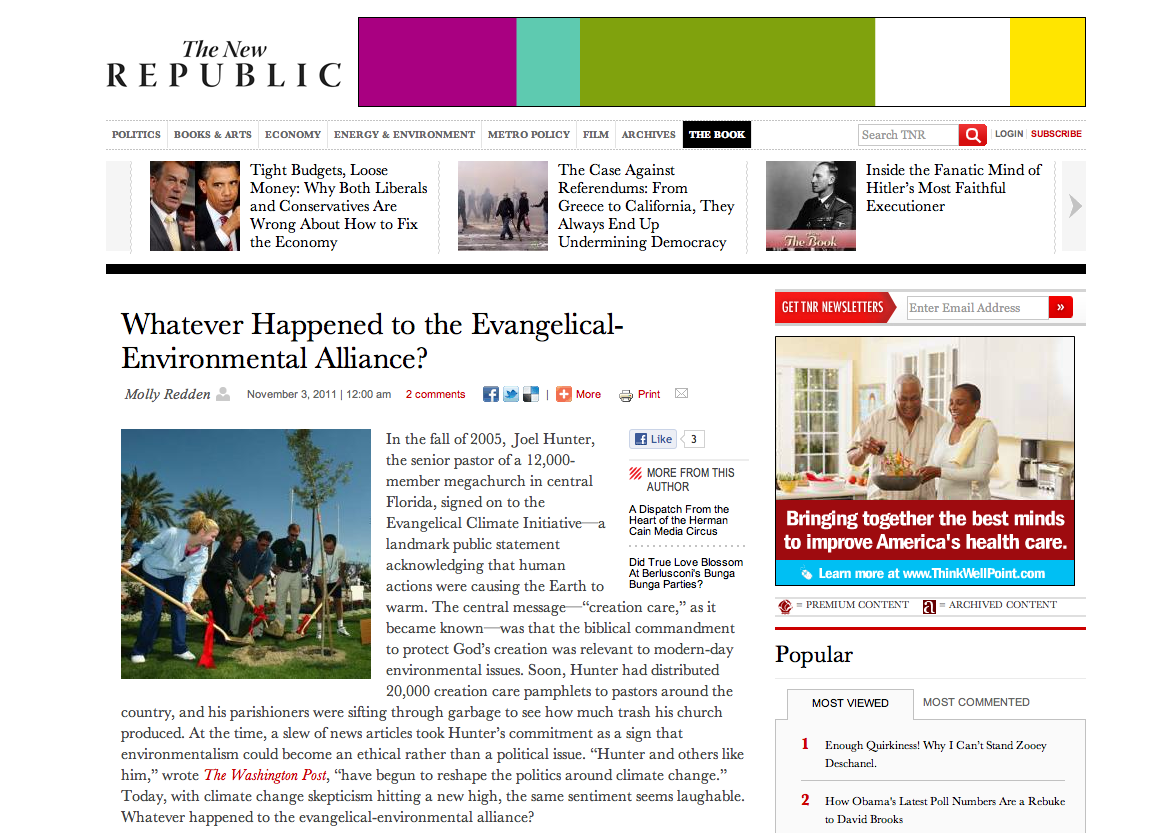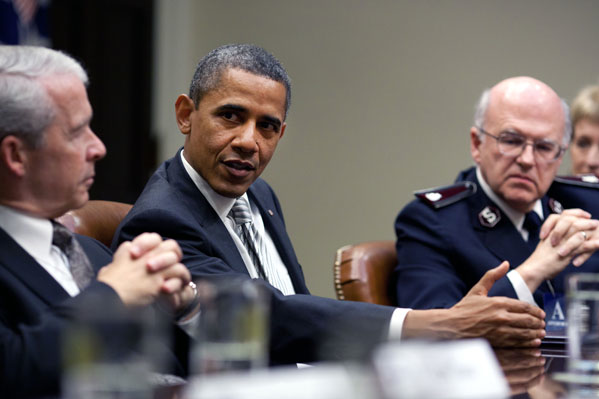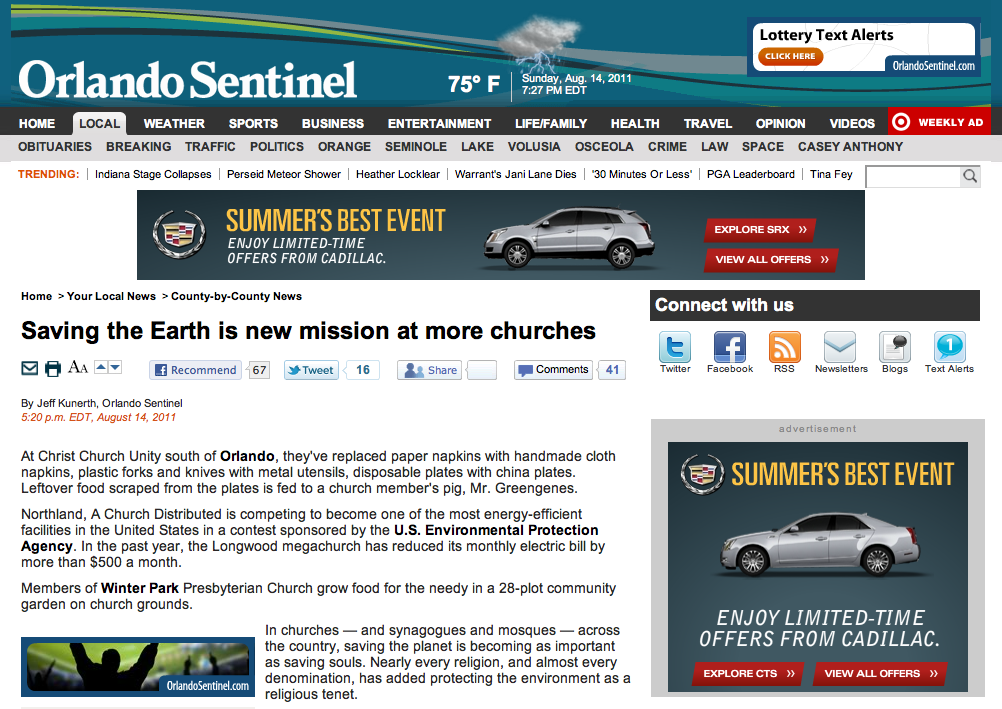Whatever Happened to the Evangelical-Environmental Alliance?
 In the fall of 2005, Joel Hunter, the senior pastor of a 12,000-member megachurch in central Florida, signed on to the Evangelical Climate Initiative—a landmark public statement acknowledging that human actions were causing the Earth to warm. The central message—“creation care,” as it became known—was that the biblical commandment to protect God’s creation was relevant to modern-day environmental issues. Soon, Hunter had distributed 20,000 creation care pamphlets to pastors around the country, and his parishioners were sifting through garbage to see how much trash his church produced. At the time, a slew of news articles took Hunter’s commitment as a sign that environmentalism could become an ethical rather than a political issue. “Hunter and others like him,” wrote The Washington Post, “have begun to reshape the politics around climate change.” Today, with climate change skepticism hitting a new high, the same sentiment seems laughable. Whatever happened to the evangelical-environmental alliance?
In the fall of 2005, Joel Hunter, the senior pastor of a 12,000-member megachurch in central Florida, signed on to the Evangelical Climate Initiative—a landmark public statement acknowledging that human actions were causing the Earth to warm. The central message—“creation care,” as it became known—was that the biblical commandment to protect God’s creation was relevant to modern-day environmental issues. Soon, Hunter had distributed 20,000 creation care pamphlets to pastors around the country, and his parishioners were sifting through garbage to see how much trash his church produced. At the time, a slew of news articles took Hunter’s commitment as a sign that environmentalism could become an ethical rather than a political issue. “Hunter and others like him,” wrote The Washington Post, “have begun to reshape the politics around climate change.” Today, with climate change skepticism hitting a new high, the same sentiment seems laughable. Whatever happened to the evangelical-environmental alliance?
Between 2006 to 2008, creation care seemed poised to transform evangelical politics. 86 evangelical leaders initially signed the Climate Initiative in 2006—it had more than 100 endorsers by the next year. Rod Dreher, a conservative columnist for The Dallas Morning News and a frequent National Review contributor, published a widely discussed book called Crunchy Cons in 2006; its lengthy subtitle celebrated “evangelical free-range farmers” among other conservative environmental types. In 2008, 45 members of the Southern Baptist Convention signed a statement saying they had been “too timid” on the issue of climate change, Pat Robertson appeared in a commercial about environmental issues with Al Sharpton, and Mike Huckabee—initially the favorite candidate of middle-America evangelicals in 2008—spoke openly about his global warming concerns.
The popularity of creation care was also taken as a sign that evangelicals cared about the environment andthat the GOP’s stranglehold on the evangelical vote might be loosening. Amy Sullivan argued this for The New Republic in 2006, and E.J. Dionne opined in 2007 that creation care was part of a larger reformation “disentangling a great religious movement from a partisan political machine.” In The New Yorker, Frances Fitzgerald argued that creation care advocates might change the GOP “beyond the recognition of Karl Rove.” When Obama captured five points more than John Kerry of the white evangelical vote, it was seen as an additional sign of shifting allegiances.
However, in late 2008, creation care’s momentum slowed, and the evangelical-GOP alliance grew stronger. Perhaps the first sign that creation care was sputtering was the abrupt departure from the National Association of Evangelicals (NAE) of its chief lobbyist, Richard Cizik, the leading force behind the Evangelical Climate Initiative. Cizik was forced out after he voiced support for civil unions between gays and lesbians, but he and his critics both traced the roots of his ouster to his strident support of environmental issues. At the time, Cizik’s departure was regarded as a mere hiccup. But, in fact, it was a sign of a backlash that would be bolstered by the rise of the Tea Party, increased scientific skepticism, and the faltering economy.
The rise of the Tea Party after 2008 was detrimental to evangelical environmentalism for two main reasons: It commanded the attention of the Republican Partyand it made room for climate change skeptics. Although it’s impossible to say if politicians instigated or reacted to the increased climate change skepticism associated with the rise of the Tea Party, by late 2009 evangelical climate skeptics were out in full force—climate change denier Senator Jim Inhofe called it “the year of the skeptic.” Tea Party senate candidates Marco Rubio, Joe Miller, Ken Buck, Christine O’Donnell, Ron Johnson, and Sharron Angle—who called manmade climate change the “mantra of the left”—all proudly advertised their climate change skepticism in the 2010 GOP primaries. Meanwhile, moderate Republican candidates, such as Illinois’s Mark Kirk, renounced their votes for cap-and-trade or were booed by Tea Party throngs for defending them. Today, polls show Tea Partiers are markedly less likely than any voter group to believe that humans were causing global warming—or that the Earth is warming at all.
A new bout of skepticism over the actual science of climate change reinforced these political positions. Creationism and a “God is in charge” belief became prominent again, along with a sense that any attempt to take climate change seriously was somehow unfaithful—even unjust. At a December 2009 Heritage Foundation event, Craig Mitchell, a Southern Baptist theologian, derided cap-and-trade as “immoral,” while other evangelical leaders blasted the evidence for climate change. Measures to address climate change were disfavored for supposedly placing burdens on poorer nations. (Ironically, concern for poorer nations at risk due to climate change had been one of the main selling points for creation care.) The Cornwall Alliance (an influential evangelical group that bills its mission as “the Stewardship of Creation”) released a declaration that claimed the “Earth and its ecosystems … are robust, resilient, self-regulating. … Earth’s climate system is no exception.” A year later, the group put out “Resisting the Green Dragon,” a 12-part DVD series decrying the environmental movement. Scientific skepticism bled into cultural skepticism. Even among moderate evangelicals, creation care struggled against general ambivalence toward environment issues—rooted in opposition to the countercultural identity that American environmentalism gained in the 1970s. As David P. Gushee, one of the authors of the Evangelical Climate Initiative, put it: To them, “it’s Pocahontas talking to spirits in the trees,” and “flower-power.”
Finally, there was the economy. Once it nosedived, it became hard for anyone to talk about policy changes with significant up-front costs. Hunter points to it as one of the main reasons why his message didn’t take among members of his own church—parishioners were just too distracted by the downturn. The circa-2006 hope that pro-business evangelicals might get behind the cost-saving appeal of conservation disappeared in the face of arguments that environmental regulations would freeze economic growth. A recent Nature article points out that the Heartland Institute, a think tank that has spent millions of dollars on coordinated attacks on climate change science, mostly focuses on the economic costs of environmentalism. “I would argue that conservation … is not a luxury, but a moral imperative,” Rod Dreher, the Crunchy Cons author, wrote to me in an e-mail. “I would also get exactly nowhere with that argument among conservatives in this economy.”
It’s true that today the optimism of 2005 is nowhere to be found. The mood has shifted so far that GOP candidates must not only renounce any environmentally friendly policies, they must also explain their past support for them. As Grover Norquist recently put it, formerly environmentally-minded GOP candidates “better have an explanation, an excuse, or a mea culpa.” Despite all the theories that environmentalism might untie the GOP-evangelical alliance, most of the white evangelical vote, for now, remains inextricably linked to the Republican Party. A glum Hunter told me that he holds out hope for the next generation, conceding that his generation probably won’t be shaking up the climate change debate like they’d hoped. The old fault lines, which Cizik told The New Republic in 2006 were “no more,” are still very much alive.
Molly Redden is a reporter-researcher at The New Republic.
Source URL: http://www.tnr.com/article/politics/97007/evangelical-climate-initiative-creation-care







